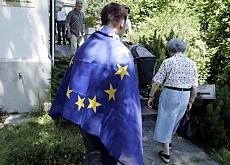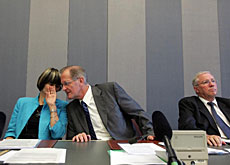Economy campaigns for labour accord

Leading figures from the Swiss economy have joined forces to campaign in favour of extending a labour accord to the European Union’s ten newest members.
Speaking at a joint news conference on Wednesday, they said it was vital people voted yes to opening up Switzerland to eastern European workers in September’s referendum on the issue.
The “firms for bilateral accords” committee, which was represented by the heads of five major business associations at the event in Bellach, near Solothurn, said a rejection of the move would bring about uncertainty and instability in the Swiss economy.
It stressed that it was not just the country’s export sector which would benefit from the extension of the free movement of people accord. One third of jobs and one Swiss franc in three in the domestic economy depend on ties with the EU, the committee said.
“The export economy is the train that pulls the carriages of the domestic economy,” said Johann Schneider-Ammann, president of Swissmem, the umbrella organisation representing the mechanical and electrical engineering industries, Switzerland’s largest export sector.
Ueli Forster, president of the Swiss Business Federation (economiesuisse), said that the Swiss economy did not want to join the EU, but should use the bilateral accords as a means to trade with its most important economic partner.
The president of the Swiss Employers’ Association, Rudolf Stämpfli, added that there would be enough measures in place to protect Swiss jobs and salaries – one of the main fears ahead of the vote.
SMEs
The heads of the Swiss Association of Small- and Medium-sized Enterprises and the Federation of the Swiss Watch Industry also voiced their support for the labour accord.
The association said that the agreement was very important for its members, as many of them already did business abroad, while the watch federation said that it appreciated the dynamic and promising markets in eastern Europe.
With 200 members throughout the country, the committee warned that a “no” vote would seriously damage the economy and would be a step backwards for Swiss bilateral accords with the EU.
The free movement of people between Switzerland and the EU’s 15 old member states has been in place since 2002.
Voters are to decide on September 25 whether it should also apply to the EU’s ten new members, after the far-right Swiss Democrats forced a referendum on the issue.
swissinfo with agencies
Ten new countries joined the European Union on May 1, 2004: Cyprus, Estonia, Latvia, Lithuania, Poland, Slovakia, Slovenia, the Czech Republic, Hungary and Malta.
The 1999 bilateral accords between Switzerland and the EU, including the one on the free movement of people, should have been automatically extended to these members.
Instead the Swiss are due to vote on whether the extension should go ahead on September 25.

In compliance with the JTI standards
More: SWI swissinfo.ch certified by the Journalism Trust Initiative


You can find an overview of ongoing debates with our journalists here. Please join us!
If you want to start a conversation about a topic raised in this article or want to report factual errors, email us at english@swissinfo.ch.